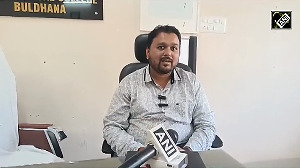As police officials from across the country continue to grill Indian Mujahideen operatives, they have discovered that a large part of the terror fund is raised through extortion and robberies.
In most of the recent operations -- 13/7 Mumbai blasts, the Jama Masjid attack last year -- carried out by the IM, they have not left any financial trail. Investigators have been keeping a close watch on transactions in Dubai and Kerala, but have not found any evidence to prove that the money was being transferred to IM operatives.
For Rediff Realtime News click here
The recent attacks are among the cheaper operations carried out by the IM and were executed with finances less than Rs 20,000. Insiders say the IM believed it was best not to risk entering wired
IM co-founder Tariq Anjum, who is now in the custody of the Delhi police, told his interrogators that nearly Rs 5 lakh was raised through street crimes like robbery and extortion. These incidents were made to look like petty crimes and the police were clueless behind the motive.
Investigations revealed that the IM operatives were not involved in these robberies. Some illegal immigrants, not affiliated with the outfit, were handed over the task.
The police have nabbed four persons in connection with such robberies from in Bihar, Uttar Pradesh and Madhya Pradesh. However, they failed to reveal any details as they themselves were kept in the dark about the 'bigger' plan.
Anjum also stated during questioning that in the days to come they were planning robberies in jewellery stores and extorting businessmen. The IM operatives were not aware that the group was on the watch-list of the international community and their financial details were being tracked very closely, he said.
Investigators, however, point out that this does not mean the end has come to hawala and other wired transactions from the Gulf. The modules handling these transactions will come into play for bigger terror operations, where more money will be involved.










 © 2025
© 2025